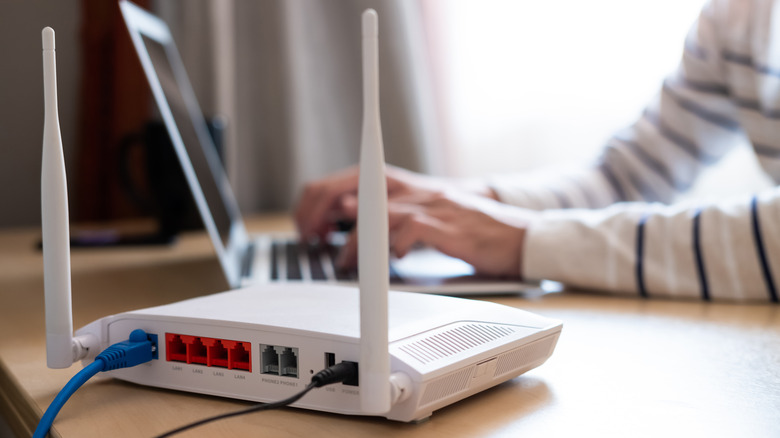Why Your Internet Is Slow And What You Can Do To Fix It
In the modern world, connecting to the internet is something that happens on a continual basis. In the evening it's common to see the television streaming video over a wireless connection and viewers browsing the internet or using apps on their phones or tablet at the same time. The internet has become an ingrained feature of modern life (via Pew Research Center).
Internet service is crucial for finding information, using entertainment services, and much more. But slow internet service can really affect the day-to-day life of any kind of user. Whether you demand a high-quality internet connection to support remote work at your home office or you're a casual Netflix viewer simply looking to watch an episode or two of your favorite show in the evening, high-quality internet speeds have become the norm. Buffering time and elongated upload or download speeds are just unacceptable in the modern, interconnected world that we inhabit. Fortunately, if your internet speed has become bogged down there are a few things that you can check for in order to improve this feature of your household.
Your hardware may be old or ill-placed
The first thing you should check when working to solve an internet connectivity issue of any sort is the hardware itself. Today, most internet users will get their data through a wireless device plugged into a corner of their kitchen or living room (although a high, central, open space is the best place to put your router for the highest speeds). The Wi-Fi box is typically provided by your cable company and encompasses both the modem and router. The New York Times reports that while these boxes can (and often do) contain both, it may be a good idea to separate those devices, especially if your wireless box is particularly old. Router technology advances fairly quickly while your modem is likely to remain a viable tool for many years at a time. Updating the router can give you enhanced speeds when connecting to the internet through your wireless connection.
It may also be worthwhile to evaluate where this box is placed in relation to other devices. Whatsabyte reports that a Wi-Fi box placed on top of a microwave, for instance, may experience interference that slows or eliminates your connection to the web. Walls are also significant hindrances when it comes to connection strength and the resulting speed. Particularly dense walls inside your home can act as a barrier to connectivity and slow down your digital speed when in certain rooms that are far enough away (or multiple walls away) from the box.
Check for viruses and spyware
When your computer becomes infected with viruses or spyware, you'll often experience a dramatic slowdown in connectivity speeds as well. Checking your hardware is always a good idea, but if this yields no significant improvement then Cisco notes it's likely that you are facing off against an enemy in the form of malware (malicious software). A computer bogged down with viruses will often run much slower than a clean machine (via WebRoot). Also, according to Kaspersky, these issues don't just affect PCs but can also influence mobile devices as well. If you can troubleshoot virus issues on your own, you should do so on a routine basis in order to ensure that your devices are clean and safe at all times.
For a more inexperienced homeowner technologically, it might be worth it to take your computer or phone to a professional in order to wipe out any malicious software that may be lingering in the background of your device. This is an important step for improving internet speed, but it can also help protect your identity and information. Malicious software is dangerous to your devices and to your personal data (via Malwarebytes). The harsh reality is that anytime you're exposed to viruses or trackers, you should treat these unwanted additions to your device as dangerous.


